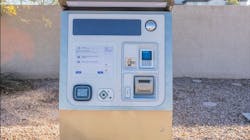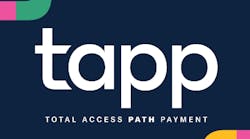Fare technology updates: PATH commuter rail, Valley Metro
The Port Authority of New York and New Jersey (PANYNJ) and Valley Metro are implementing new contactless fare payment methods and equipment throughout their systems.
PANYNJ
PANYNJ has expanded its Total Access PATH Payment (TAPP) system to the five terminal stations in the PATH system, allowing passengers to pay their fares at select turnstiles with the tap of a contactless debit/credit card, smartphone or wearable device. The first phase of the rollout is being completed this week with the installation of 12 TAPP turnstiles at the World Trade Center, the system’s busiest station.
PATH has recorded more than one million TAPPs since the system’s launch in December, indicating a quick and seamless adoption by riders. On an average weekday, nearly 20,000 TAPPs are recorded among passengers entering the PATH system.
“These TAPP numbers show we’ve tapped into something our riders truly appreciate, giving them more flexibility and more freedom in how they pay their fare,” said PANYNJ Chairman Kevin O’Toole. “The first phase of the TAPP rollout has been a resounding success and we’re excited to bring this technology to the rest of the system in the near future.”
“We’re delighted to see the rapidly growing number of PATH riders tapping into the new fare payment system and the convenience it offers,” said PANYNJ Executive Director Rick Cotton. “Bringing a 21st century tap-to-pay fare system to PATH is an important part of our much broader effort to make every element of this century-old railroad convenient and reliable for riders – modernizing equipment, renovating stations and renewing infrastructure across the system.”
Following the installation of TAPP turnstiles at the World Trade Center terminal, TAPP is now available through select turnstiles at terminal stations where PATH lines begin and end, as well as at Harrison station, including the World Trade Center and 33 St. terminals in New York, along with Newark-Penn Station, Journal Square and Hoboken in New Jersey. The six stations are the system’s busiest, accounting for 67 percent of total ridership in 2023. The TAPP rollout will move to the system’s remaining stations in New Jersey and New York during the coming months.
TAPP is an open-loop contactless payment system, which allows customers to use any contactless credit/debit card or the digital wallets in their own devices at PATH turnstiles instead of specific PATH-issued SmartLink cards or pay-per-ride MetroCards. During phase-in and for a substantial period thereafter, equipment supporting SmartLink and MetroCard will remain operational as customers become familiar with the new system. New TAPP turnstiles will continue to be installed gradually throughout the system.
The PATH commuter rail system continues to see consistent ridership growth. In 2023, the system served 50.5 million passengers, the highest ridership since pre-pandemic 2019. PANYNJ notes the 2023 ridership increase was a 19 percent increase over 2022’s total passenger volume and 61 percent of 2019’s total.
Valley Metro
Valley Metro is installing new fare machines at light-rail stations starting April 1, marking an important milestone for the agency’s Fare Technology Modernization project.
Once installed, the new machines will be covered and not in operation until later in 2024. Every station will have at least one existing machine in service that riders will be able to use until the new system is fully implemented.
The new machines will support an improved fare system that will soon allow riders to purchase and reload a Copper fare card and tap it on purple fare readers across the system.
Along with mobile fare, the reloadable fare cards are part of Valley Metro’s new account-based fare system, Smart Fare, which allows riders to pay using their account balance, track transaction history, view balances and more.
Valley Metro says Smart Fare will ensure that regardless of how many trips riders take, the appropriate amount will be deducted from their account. Local bus and light-rail riders paying full fare will not pay more than $4 per day, $20 per week or $64 per calendar month.
To be able to purchase most fare types, riders will need to choose between mobile fare or a reloadable Copper card. A 1-Ride fare will also be available for purchase at the new fare vending machines.

Brandon Lewis | Associate Editor
Brandon Lewis is a recent graduate of Kent State University with a bachelor’s degree in journalism. Lewis is a former freelance editorial assistant at Vehicle Service Pros in Endeavor Business Media’s Vehicle Repair Group. Lewis brings his knowledge of web managing, copyediting and SEO practices to Mass Transit Magazine as an associate editor. He is also a co-host of the Infrastructure Technology Podcast.






